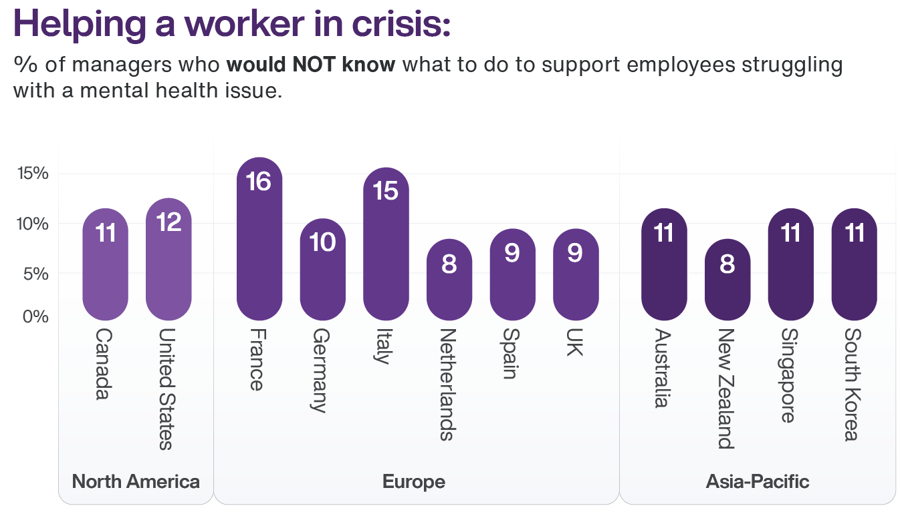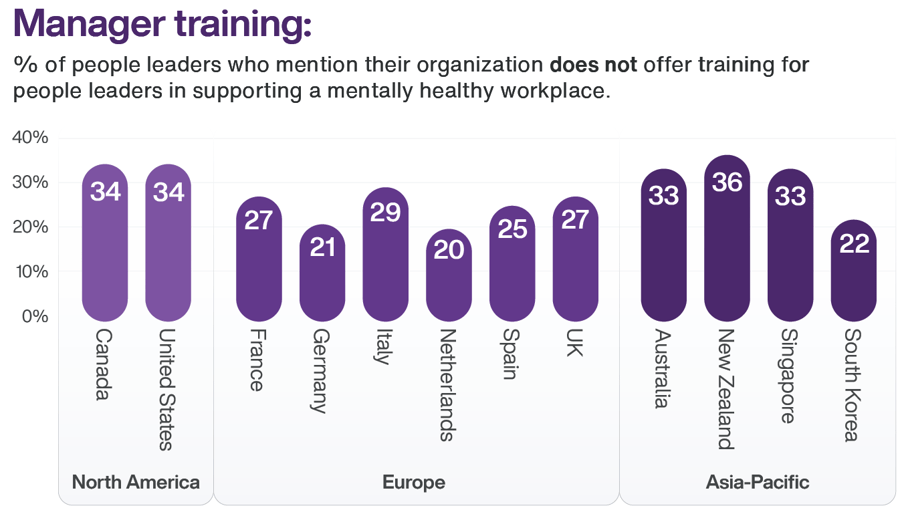.jpg?width=1281&height=504&name=Leadership%20coaching%20(2).jpg)
Why targeted leadership coaching delivers better business results
Building trust is the foundation of great leadership, yet many managers step into new roles without the right support to lead with confidence and clarity. Here’s what the data reveals about the leadership capability gap – and how a strong leadership development program and manager training programs can help close it.
Great managers do more than delegate tasks and track deliverables. They build trust with the people they lead. And trust delivers results. Research shows that employees who trust their managers are more likely to rate them as excellent – and employees with excellent managers are 6.5 times more likely to be fully engaged, 3.2 times more likely to recommend their organisation as a great place to work and 2.4 times more likely to be satisfied with growth opportunities. This is the kind of leadership that drives retention, innovation and performance.
Yet most organisations haven't adequately equipped their leaders. According to a recent NAMI-Ipsos poll, 78 per cent of managers feel prepared to support their direct reports’ mental health, yet just 63 per cent believe their company provides the necessary tools and resources. This gap is hurting both people’s mental health and organisational performance, making a strong leadership development program more essential than ever.
When trust, respect and support are absent, employees are more likely to feel isolated, disengaged and burnt out. Many report little to no access to mental health education or wellbeing resources – a disconnect between what employees need and what they experience that is eroding morale and driving turnover. This is why organisations are revisiting how they support and develop employees into leaders through manager training programs and ongoing corporate coaching solutions that reinforce capability, confidence and connection.
Aude Bohu, General Manager of Talentis by TELUS Health reinforces the importance of leadership coaching. “Today’s leaders don’t just manage work," she says," "They empower people. Coaching builds the mindset and skills needed to lead with purpose and help drive performance.”
The strategic imperative: Coaching as a competitive advantage
A promotion into leadership is universally celebrated as a professional milestone. Yet few realize that 40 to 50 per cent of new leaders fail within 18 months. The solution isn't better hiring – it’s better development, and that starts with leadership coaching.
Corporate coaching solutions can be a valuable tool for the personal development and performance of business leaders. It allows them to acquire essential skills, improve decision-making, strengthen resilience and create stronger corporate cultures. A FMI report found that 84 per cent of leaders report greater effectiveness through coaching, and 87 per cent say it delivers a strong ROI.
This isn’t one-size-fits-all training. Coaching provides personalized support tailored to each leader's specific challenges – whether navigating a promotion, leading through transformation, or strengthening their executive presence.
Despite this, many organisations struggle to close the capability gap. Research shows that 75 per cent of leaders acknowledge their direct impact on employee wellbeing, and 80 per cent of supervisors recognize their role in supporting workforce wellness – yet organisational priorities don't reflect the strategic intent. Studies show that executives discuss customers 10 times more than employees, and this ratio has widened over the last 15 years.
The solution isn’t simply more training, it’s more purposeful coaching. A personalized journey that connects leadership growth with business priorities, measures real progress, and empowers leaders to grow with empathy, agility and trust.
The current leadership development challenge
If coaching delivers such measurable returns, why aren't more organisations investing? The answer lies in ROI anxiety around measurement. This hesitation shows up in research from the TELUS Mental Health Index (MHI) on manager preparedness. The MHI tracks employee wellbeing quarterly across 12 countries using a 0–100 scoring scale, where scores below 80 indicate mental health strain.
In Germany, for example, only 49 per cent of people leaders say they would know what to do if an employee was struggling with a mental health issue. Twenty-one percent say their organisation doesn’t offer training in effective coaching or management techniques, and 20 percent are unsure. In Australia, just over half (54 per cent) of people leaders feel equipped to address employee mental health issues, and 33 percent say their organisation does not offer training on their role in supporting a mentally healthy workplace. A similar trend is evident across surveyed regions.


When managers lack these skills, their own wellbeing takes a hit. In Singapore, 50 per cent of managers who know what to do when an employee is struggling score nine points higher on the MHI than those who don't. In New Zealand, the gap is 12 points, and in the U.S., it's more than five points.
The impact doesn't stop there. Anxiety, isolation and chronic stress are already widespread across industries, impacting both wellbeing and business outcomes. Studies show that 33 per cent of workers in Europe are finding it increasingly difficult to be motivated to do their work, while 29 per cent of employees say their mental health is hurting productivity.
Forward-thinking organisations are rethinking how they develop employees into leaders and provide ongoing support that scales across teams.
What to look for in a coaching partner
Not all corporate coaching solutions are designed to deliver measurable capability development or scalable impact. The right partner should demonstrate proven methodology, global coaching expertise and the ability to support leaders at all levels of the leadership development program – from frontline managers and emerging leaders to senior executives.
When evaluating a partner, organisations should look for:
- Structured coaching methodology: Follow a professional framework with defined stages to ensure clarity and accountability. A coaching process should include four stages: briefing, discovery, coaching sessions and multi-stakeholder review to align goals and track progress.
- Empowering leaders with practical tools: Coaching should help leaders recognize and respond to the challenges their teams face, from managing stress and performance feedback to navigating conflict and preventing burnout or disengagement. By developing awareness and providing the right resources, leaders can foster a culture of care and empowerment.
- Manager-specific capability building: Strengthen practical leadership capacity, including behaviours that enable healthy team culture, such as trust, empathy, psychological safety, open communication, the ability to handle conflict resolution, and how to recognize and effectively respond to employee and team distress.
- Flexible delivery across teams and locations: Be accessible and practical for today’s workforce. Look for a partner that offers individual and group coaching that can be delivered in-person or virtually, making it easier to support leaders across countries, time zones and organisational levels.
- Measurable progress and accountability: Include review meetings throughout the coaching journey to align on KPIs, assess progress, and ensure alignment with business expectations, which should be measured against behavioural change and business outcomes.
What good coaching looks like in practice
A leadership development program typically includes around eight 1.5-hour sessions. These sessions may also include optional group coaching to help accelerate learning across manager cohorts or within an emerging leaders program.
Coach expertise matters. Working with coaches who have a strong business background in leadership positions and a proven track record of helping develop senior leaders, with accumulated experience in terms of coaching hours and ongoing supervision is key. Coaches should be considered strategic partners that work in alignment with business objectives rather than just facilitators.
Targeted leadership coaching does what traditional training alone cannot – it builds capability that sticks. When built into a leader development plan or leadership improvement plan, coaching helps to ensure that leaders gain lasting confidence and skill, and the ability to apply them in real time. These are not soft skills – in today’s workplace, they are an essential core of a strong leadership development program.
